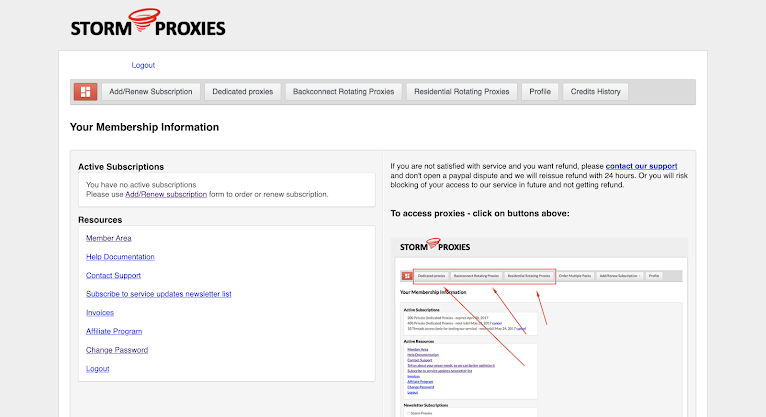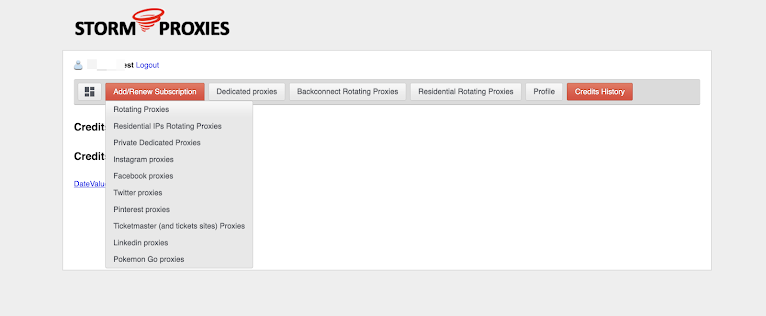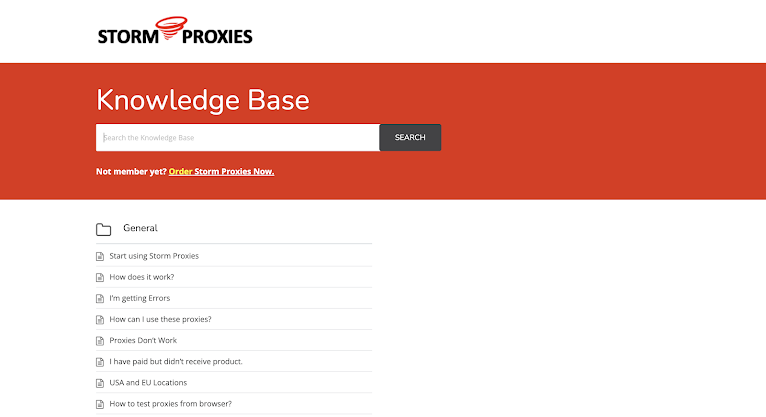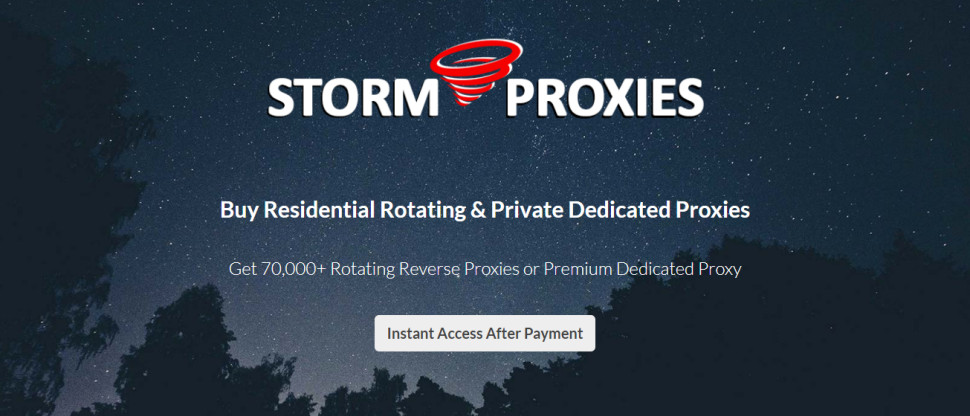TechRadar Verdict
Storm Proxies offers reliable, user-friendly residential and datacenter proxies at affordable prices. It's not as feature-rich as some competitors, but it performs its job well.
Pros
- +
Affordable
- +
Unlimited bandwidth
- +
Simple interface
Cons
- -
Limited geotargeting
- -
Small proxy pool
- -
Limited customer support
Why you can trust TechRadar
Established by a group of digital marketing experts, Storm Proxies has existed since 2016 and has grown to become a leading proxy service provider catering to individuals and small businesses. It currently runs a modest network of only 700,000+ IPs compared to some competitors that surpass 100 million. Those IPs are mainly concentrated in the United States and Europe, as opposed to the competitors that cover virtually every country in the world.
That said, where it lacks in the IP spread, it certainly makes up for it with the affordability of its proxies for basic activities. Unlike major competitors, Storm Proxies isn’t there to cover your every proxy requirement, marketing itself as a simple proxy provider and meeting expectations in this matter.
Plans and pricing
Storm Proxies provides access to three IP categories: residential rotating proxies, private dedicated addresses, and backconnect rotating proxies, each with its own distinct pricing options.
The company charges a monthly fee for private dedicated datacenter IPs according to the number of proxies. For $10/month, you can get 5 private IPs with unlimited bandwidth at 1 Gbps speed. At $20/month, you can get 10 IPs; $40/month gets you 20 IPs, $60/month provides access to 30 IPs, $90/month is guaranteed 50 IPs, $160/month means 100 IPs, $320/month is 200 IPs, and for $640/month, you can get 400 data center proxies. In other words, the higher the number of IPs, the lower the cost per IP.
Where residential rotating proxies are concerned, you pay according to the number of ports, or ‘proxy gateway’ IPs, that change every 5 minutes. Hence, access to one residential IP port costs $19/month, 5 ports are charged $50/month, 10 ports are $90/month, 20 ports are $160/month, 50 ports are $300/month, 100 ports are $550/month, 200 ports cost $900/month, and 500 ports can be yours for $1,600/month.
For reverse rotating backconnect proxies, you pay according to the number of ‘threads’ or simultaneous connections from one device. The pricing starts at $39/month and includes unlimited bandwidth for up to 40 simultaneous connections. To get 80 connections, you’ll pay $59/month, and $97/month will get you 150 connections.
There’s no free trial, but the 24-hour money-back guarantee is supposed to give you a taste of what Storm Proxies has to offer.
Features
Storm Proxies focuses on proxy IPs and lacks complementary features you’ll find on other proxy providers, such as web scraping APIs. However, it performs its core function well. Let’s explore the features users can access on this platform.
Residential rotating proxies
Residential proxies are real IP addresses sourced from physical devices. The device owners agree to add their IP address to Storm Proxies’ network in exchange for a benefit, e.g., VPN usage. Storm Proxies pools these IPs and offers them to its users.
Storm Proxies offers a roughly 700,000-strong pool of rotating residential proxies. Rotating means your IP address changes frequently, switching to a new one randomly selected from the pool. Constant rotation makes it harder for websites to detect the proxies, providing better anonymity and security.
What are residential proxies used for? Web scraping is a good use case. Suppose you run a website showing users the best sports and concert ticket deals. This website requires frequent data scraping from ticket sites like StubHub and Ticketmaster. However, these sites dislike data scraping and institute geographical and IP restrictions to block it. Storm Proxies’ residential proxies help counter these blocks.
When you use a residential proxy to visit a website, the website thinks the traffic comes from a typical device. With IP rotation, the website thinks the traffic comes from different devices visiting the site as usual. Some ticket websites block traffic from entire countries, usually those they aren’t serving. But you can simply bypass this geo-restriction by choosing a US or EU proxy.
Storm Proxies' residential proxies have unlimited bandwidth, so you don't need to worry about the volume of data being scraped. It uses encryption to hide your actual IP address from websites. During our test, Storm Proxies’ IPs offered fast speeds and performance, with little slowdown compared to accessing sites normally. The drawback is this platform’s limited proxy pool, with servers concentrated in the US and EU and negligible in other regions.
Datacenter IPs
Datacenter IPs are IP addresses tied to physical servers. These servers are sourced from secondary corporations, and Storm Proxies gives users easy access. Unlike residential proxies, which rotate every 3 to 5 minutes, datacenter IPs are static. You'll get one IP for a long time, but you can request up to two replacements monthly.
(Datacenter IPs are IP addresses tied to physical servers. These servers are sourced from secondary corporations, and Storm Proxies gives users easy access. Datacenter IPs offer rapid speed and performance. In this case, a physical server with a stable connection sits as an intermediary between you and the Internet. This is much better than relying on an end user’s PC or mobile phone (residential IP), which might have an unstable connection.
If you’re scraping massive data volumes, datacenter IPs are the best choice because of their better reliability and speed. The drawback is their limited reach, with Storm Proxies offering datacenter IPs only in the US (Cheyenne, Los Angeles, and New York City). If you need a datacenter IP in Asia, Europe, the Middle East, and other continents, Storm Proxies can’t fulfill this need.
Backconnect rotating proxies
Backconnect proxies are a type of proxy server that dynamically routes traffic through a pool of rotating IPs. Storm Proxies lets you choose proxies that change every 3 minutes or 15 minutes. A 3-minute proxy is suitable for regular browsing or account creation, while 15-minute proxies are suitable for longer browsing sessions. You can also get a fresh IP address with every new HTTP request, enhancing your anonymity.
Storm Proxies gives you one or several "proxy gateway" IPs that you'll enter inside your proxy management software. With this connection set up, you'll receive a new proxy IP on every HTTP request, every 3 minutes or every 15 minutes (depending on what you choose). You don't need to manually change IPs in your proxy management software: everything works automatically on Storm Proxies' side.
The maximum number of backconnect proxy connections you can open depends on your proxy plan. Storm Proxies offers different plans ranging from 40 to 150 simultaneous connections. The lowest plan provides one IP address, and the highest includes 3 IP addresses for different computers. Users get unlimited bandwidth, so there’s no need to worry about your data scraping volumes.
Storm Proxies’ backconnect proxies were reliable during our test. We liked that the pools rotated automatically while we surfed the web seamlessly. We chose the option for a new IP address with every request, enabling us to bypass geo-restrictions more effectively, although we encountered a few request failures. The main drawback remains Storm Proxies’ limited 700,000-IP pool, unlike many competitors that give access to tens of millions of global IPs.
It’s worth noting some features that Storm Proxies lack. The first is a web scraping API, which many competitors provide. Web scraping is the most common use case for proxy servers, so many proxy providers offer APIs to assist users. This feature lets people kill two birds with one stone: getting reliable proxies and the APIs to leverage those proxies for data scraping.
Web scraping APIs let you automate massive data scraping tasks. You’ll choose the website you want to scrape from and select your data type, and the API fetches the data. The timing depends on the volume of data being scraped. APIs let you automate scraping tasks ahead of time. Unfortunately, Storm Proxies doesn’t provide this feature.
We don’t like that Storm Proxies doesn’t offer bandwidth-based pricing plans, which can be more economical for small users. If you need just a few GB of proxy bandwidth, it’ll be more cost-effective to pay for precisely that rather than subscribe to a monthly plan you won’t fully utilize. We also don’t like this platform’s limited geographical reach, with servers primarily in the US and EU. But if you’re looking for reliable proxies in these regions, Storm Proxies is an excellent choice.
Ease of use
Storm Proxies offers a simple dashboard that we found easy to use. Setting up your proxies is as simple as it gets, helped by its limited features (there's not much to navigate). Creating an account requires your full name and email address. Then, you'll be asked to select a plan, although you can register without paying initially. After registration, you’ll be taken to the dashboard to access the proxies you paid for.

The user interface is simple, with all options at the top and the main dashboard below. From this menu, you can renew your plan, deploy new proxies, change credentials, and whitelist IPs. However, we noticed a user interface-related drawback: the lack of usage reports.

Most proxies we've tested provide extensive usage reports, letting users know how much bandwidth they've consumed over time. But Storm Proxies doesn’t have this feature, which we consider a disadvantage. On the bright side, Storm Proxies offer unlimited bandwidth, so you don’t need to monitor your usage rigorously.
Customer support
Customer support is an area where Storm Proxies needs considerable improvement. It claims to offer "24/7 Premium Support, but this support is only available via email. There's no live chat or telephone option to communicate with support staff in real-time. You can wait up to 24 hours to get a response to a support email. Storm Proxies’ support system isn’t the best when you need solutions to urgent issues.
There's an official Knowledge Base with solutions to common user challenges, e.g., “How do I start using proxies?” You can consult this Knowledge Base after encountering any issue, then seek direct support if you don’t find a solution to it.

The competition
The proxy server industry is very competitive, meaning we can give Storm Proxies an endless list of formidable competitors. We’d like to highlight Bright Data and Oxylabs as the main rivals.
Bright Data is a stellar proxy provider that offers residential, datacenter, ISP, and mobile proxies from its gargantuan network of 72 million+ IPs. It also offers sophisticated web scraping APIs, letting users kill two birds with one stone. Overall, we consider Bright Data a better proxy service than Storm Proxies, albeit a more expensive one.
Oxylabs has a massive pool of 175 million+ proxies, compared to Storm Proxies’ minuscule 700,000+. It provides residential, datacenter, ISP, and mobile proxies, plus web scraping APIs and pre-built datasets. Oxylabs is a more sophisticated proxy provider than Storm Proxies. However, unlike Storm Proxies, which offers unlimited bandwidth, its residential IPs are bandwidth-limited.
Final verdict
Offering only residential and dedicated datacenter proxies, limited customer support, and a tiny number of accessible IPs compared to many competitors, Storm Proxies is far from being a very sophisticated proxy provider. Still, it’s one of the best budget proxy platforms in the industry. If you need a bit of data scraping from US and EU websites, then Storm Proxies is the way to go. This means it’s best suited for individual and small business users and not enterprises seeking a solution for massive data scraping tasks.
We've also highlighted the best proxy and best VPN
Stefan has always been a lover of tech. He graduated with an MSc in geological engineering but soon discovered he had a knack for writing instead. So he decided to combine his newfound and life-long passions to become a technology writer. As a freelance content writer, Stefan can break down complex technological topics, making them easily digestible for the lay audience.
- Mayank Sharma
- Sead Fadilpašić
- Jonas P. DeMuro
- Mike WilliamsLead security reviewer
You must confirm your public display name before commenting
Please logout and then login again, you will then be prompted to enter your display name.

